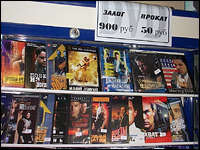Dispatch from Saratov: Cinema and Video in Russia
 Are you familiar with the ancient Oriental symbol of a snake biting its own tail? That's the Russian perception of the movies. Nobody else is present in the circle, but a little turmoil still exists.
Are you familiar with the ancient Oriental symbol of a snake biting its own tail? That's the Russian perception of the movies. Nobody else is present in the circle, but a little turmoil still exists.
There are a few distinct periods in the contemporary provincial Russian perception of films. The earliest one was pure as distilled water. Soviet movies could be a junkyard of phantoms or a strong, solid cornerstone, depending on your viewpoint. Formerly Soviet directors—those who didn't make communist sagas about the heroic work and life of the regular Soviet people—were oriented to pure art. They made great films about friendship, love, and human existence. They worked on impossible questions and found impossible answers: a virtual machine of allegorical language, like Aesop's fables.
We are imbued with that. To catch an abstraction is our middle name. The famous local phrase, "A poet in Russia is bigger that just a poet," oriented us to search for hidden meaning in any masterpiece. Simple plots are not for Russia. That tail from a crystal-clear past is always with us.
 The second phase began when video began to leak into a sealed society. People waited to buy video recorders for months. They stood in line for days. We were lucky to see a fifth- or sixth-generation copy from an original tape. Watching on black-and-white screens, Russians were exposed to the rest of the movie world.
The second phase began when video began to leak into a sealed society. People waited to buy video recorders for months. They stood in line for days. We were lucky to see a fifth- or sixth-generation copy from an original tape. Watching on black-and-white screens, Russians were exposed to the rest of the movie world.
Yes, dear Americans, it was you, first of all. The American movie invasion began. We watched four to six films per day, all night long, every night. It was a real thirst. From the beginning, Russians didn't understand American comedies, but all other genres excited us. It was strictly prohibited, but one day a dike was broken. The flood came, and we sank.
Russian video fans are video partisans. In Russian provinces, good video films are usually bought twice: First, a pirate copy recorded with a video camera from the screen of a movie theater, and again when the film is released officially. Between these two events, maybe six to ten months go by. A screen-copy cassette will be used for recording from TV later. Of course, a copy from the screen is colored only in green and blue and is often too dark, but it arrives amazingly soon after the movie's premiere—usually within 10 days. If you like a film, be prepared to wait about half a year before it is released in good quality, with the dialog dubbed by a single voice. This type of translation is preferable because it doesn't mask original voices.
 American movies changed our perception of films. We began to think about the quality of the sound and picture. We became aware of Dolby. We took a look at our long Soviet tail. But the strange thing is this: The alien influences were provided not by blockbusters but by other films. After the first emotional explosion, we often choose alternative movies. People here are hunting for Gilliam, Kitano, Jarmusch, Greenaway, and similar filmmakers. And they search for old local films not released on video before. If two TV channels both show good films, we always choose a Russian one—the older, the better. We really miss our old films. It is our nature to see more in a film than decorations, special effects, and dialog.
American movies changed our perception of films. We began to think about the quality of the sound and picture. We became aware of Dolby. We took a look at our long Soviet tail. But the strange thing is this: The alien influences were provided not by blockbusters but by other films. After the first emotional explosion, we often choose alternative movies. People here are hunting for Gilliam, Kitano, Jarmusch, Greenaway, and similar filmmakers. And they search for old local films not released on video before. If two TV channels both show good films, we always choose a Russian one—the older, the better. We really miss our old films. It is our nature to see more in a film than decorations, special effects, and dialog.
But now there are almost no new fatherland films released. The economic crisis is partly to blame, but I think it is also because our directors and screenwriters are just now digesting what they opened up to a few years ago: the rest of the cinema world. To be popular in Russia, it is not enough any more to shoot high-budget movies. And they feel it. The old high marks of understanding the world were expanded by complementary visions from outside.
We begin the third period today: an integration into the worldwide enterprise system. We look at Hi-Fi VCRs and DVD players on the shelves of shops. This sector of the market here has surrendered to Japanese and Korean manufacturers. If you want to buy new video gear in the Russian heartland, it's better to go to small audio/video resellers. Big stores have slow personnel; they are polite but have no sparkle in their eyes. Often they cannot help you set up your new toy correctly.
 A little reseller has no big demonstration rooms and he might not have on a tie today, but he knows the things he sells. He is burning exactly as you are. You both will play with that gear all day and even into the night. It is not all business here; the seller-gnome is an enthusiast himself. After closing time, his store becomes a test lab. Russians are as far from professional selling as they were earlier. To say it honestly, the foreign managers who work here as if in a story do not go much further . . .
A little reseller has no big demonstration rooms and he might not have on a tie today, but he knows the things he sells. He is burning exactly as you are. You both will play with that gear all day and even into the night. It is not all business here; the seller-gnome is an enthusiast himself. After closing time, his store becomes a test lab. Russians are as far from professional selling as they were earlier. To say it honestly, the foreign managers who work here as if in a story do not go much further . . .
In the near future, maybe DVD will teach us what entertainment is all about. It has started to appear in our local high-tech equipment stores. DVD discs are for rent, not for sale, but all genres are present. We have great action films and comedy, but what do people like to rent mostly? Knockin' at Heaven's Door, The Big Lebowski, and The Shawshank Redemption. Maybe these movies are closer to the "enigmatic Russian soul." Maybe it's a clue to how to resolve the abra-cadabera of our lives.
How can you buy a DVD disc if its cost is higher than your monthly wage? Impossible questions have impossible but real answers: Watch DVDs right in the store! Simple plots are not for Russia.
- Log in or register to post comments





























































